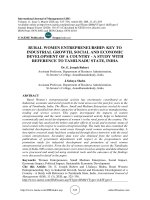Economic growth and economic development 187
Bạn đang xem bản rút gọn của tài liệu. Xem và tải ngay bản đầy đủ của tài liệu tại đây (65.14 KB, 1 trang )
Introduction to Modern Economic Growth
unexploited and resources are misallocated. We therefore expect societies with economic institutions that facilitate and encourage factor accumulation, innovation and
the efficient allocation of resources to prosper relative to societies that do not have
such institutions.
The hypothesis that differences in economic institutions are a fundamental cause
of different patterns of economic growth is intimately linked to the models we will
develop in this book. In all of our models, especially in those that endogenize physical capital, human capital and technology accumulation, individuals will respond
to (profit) incentives. Economic institutions shape these incentives. Therefore, we
will see that the way that humans themselves decide to organize their societies determines whether or not incentives to improve productivity and increase output will
be forthcoming. Some ways of organizing societies encourage people to innovate,
to take risks, to save for the future, to find better ways of doing things, to learn
and educate themselves, to solve problems of collective action and to provide public goods. Others do not. Our theoretical models will then pinpoint exactly what
specific policy and institutional variables are important in retarding or encouraging
economic growth.
We will see in Part 8 of the book that theoretical analysis will be useful in
helping us determine what are “good economic institutions” that encourage physical and human capital accumulation and the development and adoption of better
technologies (though “good economic institutions” may change from environment
to environment and from time to time). It should already be intuitive to the reader
that economic institutions that tax productivity-enhancing activities will not encourage economic growth. Economic institutions that ban innovation will not lead
to technological improvements. Therefore, enforcement of some basic property rights
will be an indispensable element of good economic institutions. But other aspects of
economic institutions matter as well. We will see, for example, that human capital is
important both for increasing productivity and for technology adoption. However,
for a broad cross-section of society to be able to accumulate human capital we need
some degree of equality of opportunity. Economic institutions that only protect a
rich elite or the already-privileged will not achieve such equality of opportunity and
will often create other distortions, potentially retarding economic growth. We will
173









